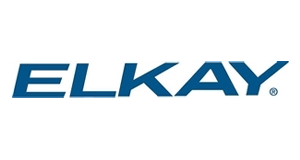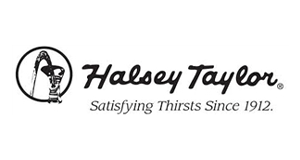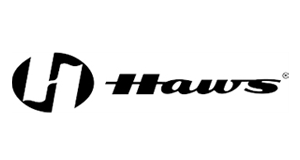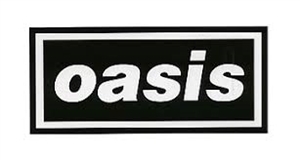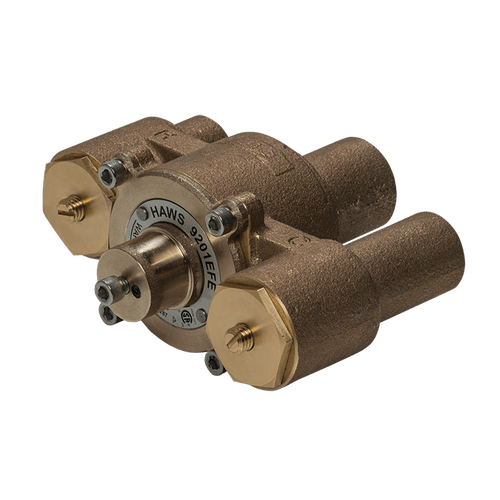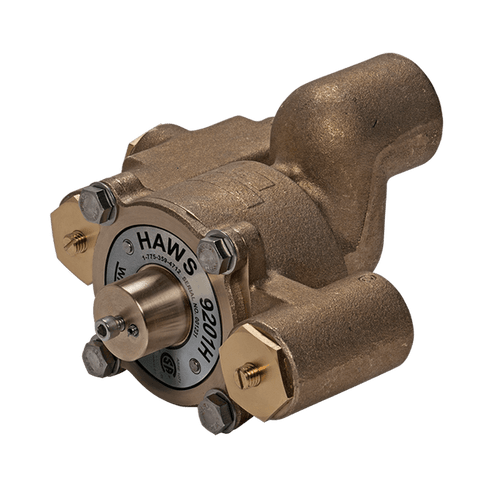Product Information
Haws TWBS.EWE Thermostatic Mixing Valve
Model TWBS.EWE Description
Model TWBS.EWE, low-lead Emergency Valve (patent pending) thermostatically mixes hot and cold water to provide a safe fluid supply for emergency eyewash equipment. The valve contains a secondary high temperature limit valve to provide additional protection to the user in the event of main tempering valve malfunction. Additionally, to ensure a fail-safe water supply for emergency shower and eyewash stations, a series of cold water by-pass valves open in the event of hot water pressure loss. (No gauges supplied - ASSE 1071 standard recommends gauges be placed 5 to 8 feet (1.52 to 2.44 m) downstream for the most accurate temperature measurement.)
- A flow rate of 1 to 12 gpm (3.8 to 45.4 L) for better temperature control across the operating range
- AXION's superior design and technology provide a complete safety solution for increased victim comfort
- Lowest internal pressure drop for this class of valve (advantage where supply pressure is low)
- Wax based thermostat technology for fast response time with proven highly reliable temperature control
- Highest Cold Water Bypass flow rate in the industry (83% of rated tepid flow rate)
- Low-lead brass valve design with internal check stops
- Oversized valve seats resist failures caused by foreign matter
- A new and efficient shuttle design eliminates valve binding
- A custom funnel design improves temperature control at low flow rates
- Outlet temperature is factory set to 85° F (29° C)
- Tempered water: High temperature limit is factory set to 87°F (30° C)
- Cold water by-pass valves are closed during normal operation, regardless of flow rate
Listings: CSA certified per ASSE 1071, ANSI Z358.1, applicable sections of CSA B125.3, NSF/ANSI 372, NSF/ANSI 61-section 8, California Health and Safety Code 116875 (AB 1953)..
Prop 65 Warning. For California Residents Warning: This product contains a chemical known to the State of California to cause cancer and/or birth defects or other reproductive harm.
Haws TWBS.EWE Thermostatic Mixing Valve
Model TWBS.EWE Description
Model TWBS.EWE, low-lead Emergency Valve (patent pending) thermostatically mixes hot and cold water to provide a safe fluid supply for emergency eyewash equipment. The valve contains a secondary high temperature limit valve to provide additional protection to the user in the event of main tempering valve malfunction. Additionally, to ensure a fail-safe water supply for emergency shower and eyewash stations, a series of cold water by-pass valves open in the event of hot water pressure loss. (No gauges supplied - ASSE 1071 standard recommends gauges be placed 5 to 8 feet (1.52 to 2.44 m) downstream for the most accurate temperature measurement.)
- A flow rate of 1 to 12 gpm (3.8 to 45.4 L) for better temperature control across the operating range
- AXION's superior design and technology provide a complete safety solution for increased victim comfort
- Lowest internal pressure drop for this class of valve (advantage where supply pressure is low)
- Wax based thermostat technology for fast response time with proven highly reliable temperature control
- Highest Cold Water Bypass flow rate in the industry (83% of rated tepid flow rate)
- Low-lead brass valve design with internal check stops
- Oversized valve seats resist failures caused by foreign matter
- A new and efficient shuttle design eliminates valve binding
- A custom funnel design improves temperature control at low flow rates
- Outlet temperature is factory set to 85° F (29° C)
- Tempered water: High temperature limit is factory set to 87°F (30° C)
- Cold water by-pass valves are closed during normal operation, regardless of flow rate
Listings: CSA certified per ASSE 1071, ANSI Z358.1, applicable sections of CSA B125.3, NSF/ANSI 372, NSF/ANSI 61-section 8, California Health and Safety Code 116875 (AB 1953)..
Prop 65 Warning. For California Residents Warning: This product contains a chemical known to the State of California to cause cancer and/or birth defects or other reproductive harm.

